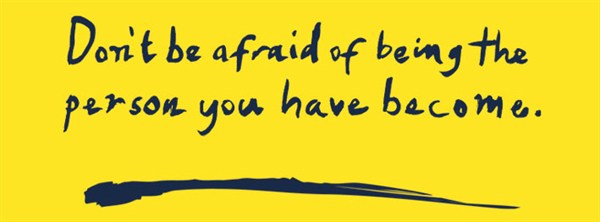Don’t be afraid of being the person you have become
08 Jan 2013 | Albert Espinosa
The article below is an excerpt from The Yellow World - a book
by Albert Espinosa who survived ten years of cancer, from
ages 14 to 24, and lost a leg, lung, and part of his liver. His
book presents the 23 life lessons he learnt and how we can apply
those to our everyday lives to find happiness.

'Albert, trust the person
you used to be. Respect your past self.'
My doctor always told me that he wanted the best for me, but
sometimes what seemed the best ended up not being the best. It's
difficult to know how a human body will react to a drug, or a
therapy or an operation. But he asked me to trust him, and he
emphasized this: 'I've always believed,' he said, 'that if my "past
me" took this decision, it was because he believed in it. [Your
'past you' is you a few years, months or days ago.] Respect your
past you.'
This was a great piece of advice. Maybe at that exact moment I
didn't think of it in that way. I was about to have an operation
and I really hoped that his 'present him' wasn't going to make a
mistake.
After I left the hospital I reflected on these words. It was a
great discovery, not just for medical purposes but for everything.
We tend to think that we take the wrong decisions; it's as if we
think that we're cleverer now than we used to be, as if our past
selves hadn't balanced all the pros and cons of the decisions we
make.
Ever since that doctor told me about his past self, I've always
believed in my past me. I even think he's cleverer than my future
me. So when I sometimes make a wrong decision I don't get annoyed,
I remember that I took the decision myself and that it was
considered and thought through (one thing is true, I always try to
think through and consider my decisions).
You mustn't be upset by the wrong decisions you make. You have
to trust your past you. Of course your fifteen-year-old you could
have made a mistake not taking that class, or your
twenty-three-year-old you shouldn't have gone on that trip, or your
twenty-seven-year-old you shouldn't have taken that job. But it was
you who took those decisions and you must have dedicated some time
to taking them. Why do you think that you've now got the right to
judge what he, your past you, decided to do? Accept who you are,
don't be afraid of being the person that your decisions have made
you into.
Bad decisions crystallize, bad decisions, after a while, turn
into good decisions. Accept this and you will be happy in your life
and above all happy with yourself.
My doctor made three or four mistakes. I never threw these
decisions in his face because I didn't think that his mistakes came
from a lack of experience or professionalism. In order to make
mistakes, one has to take risks; the result is the least
important part of the process.
I am sure that if we got your eight-year-old you, your
fifteen-year-old you and your thirty-year-old you together in a
room they would have different ideas about almost everything and
they would be able to justify every decision they'd taken. I love
trusting my past me; I love living with the results of the
decisions he took.
I have a huge scar over where my liver is from surgery. The
operation wasn't any use in the end because there was nothing wrong
with my liver, but my doctor had thought I had cancer and that if I
wasn't operated on then I would die. This scar makes me feel very
proud, makes me feel a lot of different feelings whenever I see it.
Everything that provokes a surge of emotions is positive, extremely
positive. So:
- Analyse any decisions you've taken that you think were
mistakes.
- Remember who took them. If it was you, remember the reasons you
had. Don't believe that you are cleverer than your past you.
- Respect your decisions and live with them.
- Eighty per cent of you is the consequence of decisions you've
taken. Love yourself for what you are; love yourself for what you
have become.
- Above all, acknowledge that you sometimes make mistakes. The 20
per cent of you made out of mistakes is something you have to
acknowledge and accept.
Like that doctor told me: acknowledgementis the key word. You
have to acknowledge yourself, acknowledge how you became what you
are and acknowledge whose fault it is.
They taught us in the hospital to accept that we can make
mistakes. My doctor sometimes made mistakes and always accepted the
blame. The world would run more smoothly if we all accepted that we
make mistakes, that we have made mistakes, that we're not perfect.
Lots of people try to find excuses for their mistakes, look for
someone else to blame, shift liability for deaths on to other
people; they never know the joy of accepting responsibility. There
is joy in the knowledge that you have made a wrong decision and
that you acknowledge it.
I would love to see more trials where people admit their guilt,
or drivers stopped for breaking the speed limit admit that they
were going too fast.
We have to acknowledge that we make mistakes in order to see
where the mistakes are and not make them any more. Maybe lots of
people are afraid of the punishment that will follow from this
admission, but the punishment is the least important bit; the only
important thing is to give your brain the correct information.
---
The Yellow World is published by
Particular Books and available on Amazon

Albert Espinosa never wanted to write a book about surviving
cancer, so he didn't. He wrote a book instead about the Yellow
World. It is the name of a way of living, of seeing life, of
nourishing yourself with the lessons that you learn from good
moments as well as bad ones. It is the world that makes you happy,
the world you like living in. The yellow world has no rules; it is
made of discoveries. In these 23 discoveries Albert shows us
how to connect daily reality with our most distant dreams. He tells
us that 'losses are positive', 'the word "pain" doesn't exist', and
'what you hide the most reveals the most about you'.
Albert has won several battles with death, which is why his
stories are full of life. His greatest hope is that after you have
read this book you will go off in search of your yellow
world. At the age of thirteen, Albert was diagnosed with
cancer, an event that changed his life forever. When he was
fourteen, his left leg had to be amputated. At sixteen his left
lung was removed, and when he was eighteen part of his liver was
taken out. After ten years in and out of hospitals, when he was
finally told that he had been cured of the disease, he realised
that his illness had taught him that what is sad is not dying, but
rather not knowing how to live.
Tags:
Be comfortable with who you are